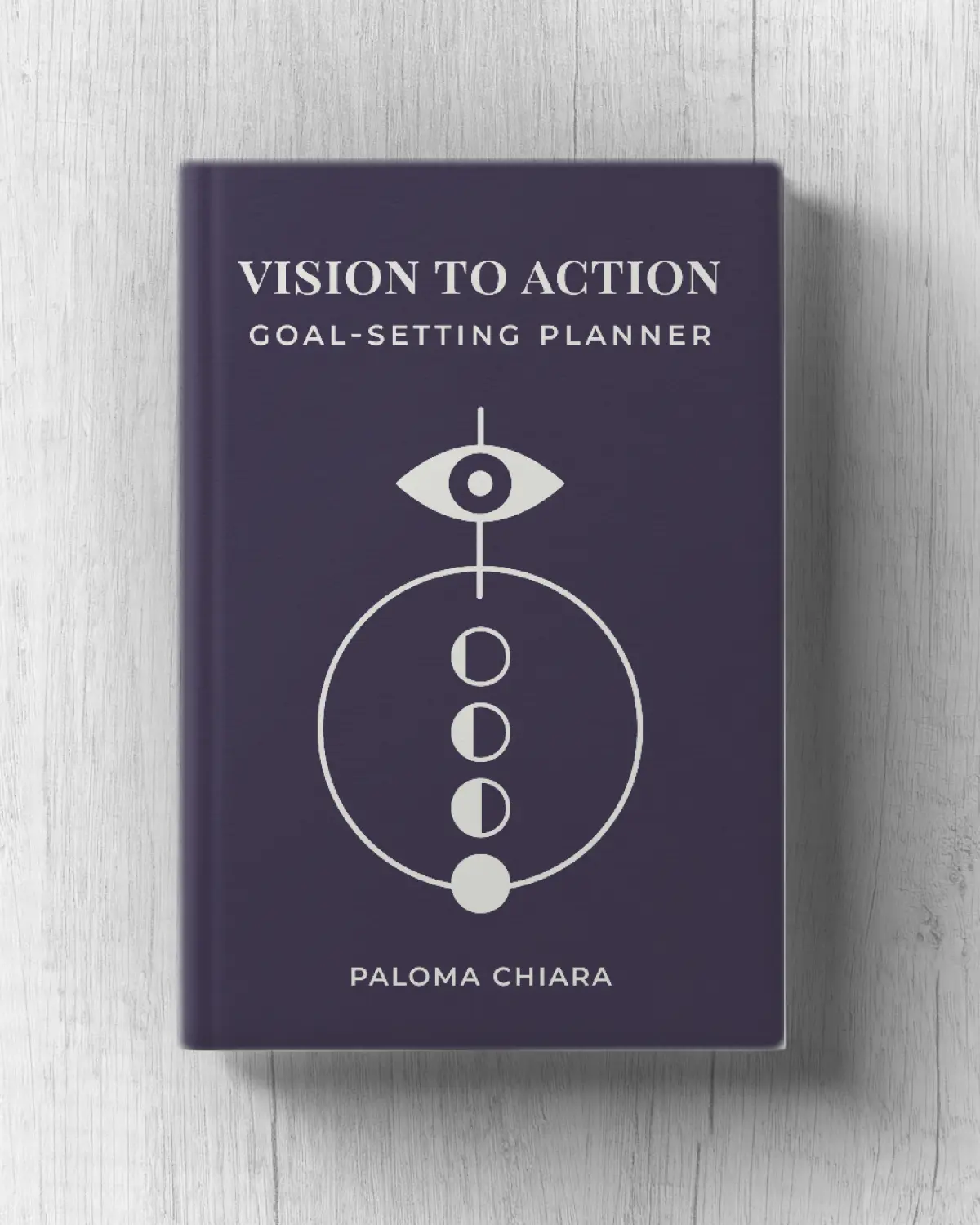Strategic Time Blocking
Paloma Chiara
This episode explains what strategic time blocking is and how it can help improve productivity and work-life balance. It involves planning in a way that maximizes mental capacity and reduces decision fatigue.
In today’s episode I’ll be talking about strategic time blocking.
Ever had that feeling when it’s 5 PM and you realize you spent your whole day answering other people’s needs, without making any real progress on your long-term goals?
It’s super frustrating, right? And what’s worse is you know you worked hard all day. You were “busy” - always moving, always responding. But somehow, you didn’t get anywhere with what really matters.
The Benefits of Time Blocking
This is where time blocking makes a big difference. Simply put, time blocking just means planning specific time periods for specific tasks. Instead of working from a long to-do list, you actually put each task into a time slot in your calendar.
With this method you’ll start seeing the benefits rather quickly. It makes sure you are realistic about what you can actually do in a day. Most of us think we can do way more in a day than we really can, which makes us feel like we’re always behind on things. When you time block, you see the truth about how much time you have, which helps you make better choices about what really needs your attention.
Time blocking saves the mental energy you waste deciding what to do next. That decision fatigue is a real thing, there’s been studies about this, it drains your brain power all day. When your schedule is already planned, you just follow the path instead of arguing with yourself about what to do first.
It also creates accountability, because instead of saying, oh I’ll work on my project sometime this week, this time you’ll know, you’ll be working on it on Tuesday from 10 AM to 12 PM for example.
Time blocking is also one of the best cures for people who multitask. Look, the truth is, multitasking isn’t a real thing, what I mean is that your brain isn’t actually doing multiple things at the same time, it’s just switching quickly between tasks. It might feel productive, but it isn’t in reality. So when you’ve blocked time for a specific task, you’ve promised to focus only on that one thing.
Another thing I like about time blocking is that it helps you create your ideal day that you can continually pursue. This is powerful motivation. Why? Well, we all have things we say are important - exercise, focused work, family time, learning - but somehow the less important stuff pushes them out. When your calendar reflects not just obligations but also activities that energize you, you’ll find yourself more excited to follow your schedule.
Finally, time blocking can improve your work-life balance, because it allows you to plan when you work and when you don’t, meaning you create clear lines that protect your personal time. This stops work from taking over all the free space in your life.
Planning Around Your Energy Levels
But here’s where we really take it up a notch: strategic time blocking. Rather than normal time blocking, where you organize your day in order, you start doing it strategically, as in organizing it based on your energy levels and brain power.
Most people make the mistake of treating all hours as the same – but they’re really not. Your brain has a limited amount of decision-making and creative power each day. It’s like a battery that starts full in the morning and drains out during the day.
This means you need to save your best brain hours for your hardest work. Think about when you’re naturally most focused and creative. For most people, it’s first thing in the morning, but, who knows, maybe for you it’s in the evening or night time. Everyone is different.
Let’s clarify what I mean when I say tasks that require lots of brainpower. These are the tasks that require creative thinking and problem-solving. This would be writing proposals, creating presentations, as well as studying difficult topics or even just making important decisions.
The tasks that require the least amount of brain power are generally part of a routine or a bit repetitive, like answering emails, filling out forms, and attending meetings where you know you’ll mostly just be listening.
Many of my clients have this problem - they’re using their most productive hours for monotonous work and then wonder why they can’t make progress on important projects when they finally get to them later in the day, when their brain is already tired. This is often because they haven’t matched their tasks to their energy patterns.
Of course, the problem isn’t that they don’t work hard enough. These are some of the hardest working people I know. The problem is that they’re fighting against their own body rhythms and brain chemistry. When you work against your natural energy flow, you’re making everything harder than it needs to be. It’s like swimming against the current instead of with it.
The hardest part for most people? Learning to protect those hours like their job or career depends on it - because, well, it really does. You have to get people to respect your focus time, which can be uncomfortable at first but it does pay off in the end.
I love seeing the results with my clients, not only because they get more work done in those protected hours than they previously did in entire days, but also because they create consistency with their self-care practices, and get a healthier work/life balance.
You might be thinking, this feels too rigid and structured to me. But most people find the opposite - when important personal activities are blocked into your calendar with the same priority as work meetings, you actually end up with MORE freedom and enjoyment, not less. This structure paradoxically creates freedom because you know exactly when you’ll handle each part of your life.

Check out the Vision to Action Planner for only 6$
More infoHow To Do Strategic Time Blocking
So, does it sound like it might be for you? If it does, here’s your plan to start:
First, choose which app you will use. Most people use Google Calendar, which syncs well with most other apps, and also allows for both event and task scheduling. You can also make certain events or tasks repeat if they’re going to be part of your new routine, and set up the notifications if you struggle with your attention. Oh- and another thing that’s super useful is choosing different colors for each type of task, so it’s visually easier for you to see what you’re allocating your time to. That would be like having all tasks in the rest category, such as yoga, meditation, naps, etc. in purple, and so one.
Second, find out when you have your highest brain power and energy. When do you naturally feel most alert, focused, and creative? Pay attention to when you naturally do your best thinking. For me personally, it’s about one hour after I wake up, once I’ve been able to eat and do my morning routine.
Third, use those hours only for the work that actually moves you toward your most important goals - the kind of work that, when finished, makes you feel like you’ve truly done something meaningful. This could be developing that new product, writing that important proposal, or solving that complex problem that’s been on your mind for weeks.
Fourth, build a wall around these hours. Block them on your calendar. Turn off your notifications. Tell your team these hours are not to be disturbed. If someone asks for a meeting during this time, offer other times. Your time is your most valuable asset - treat it that way. This might feel uncomfortable at first, especially if you’re used to being constantly available, but it’s essential for doing work that matters.
Fifth, group similar types of work together. Put all your emails, calls, and meetings into set blocks OUTSIDE your best hours. Your brain works better when it’s not constantly switching between different kinds of tasks. For example, maybe now you’ll only check your email twice, rather than constantly throughout the day.
Lastly, plan extra time. Life happens, things will go wrong, meetings will run long. Emergencies are bound to happen. So, if you don’t plan for extra time, your whole system will fall apart the first time something unexpected happens. Make sure you leave buffer blocks in your day - 15-30 minutes between major activities to handle overruns or unexpected issues.
Combine Your Brain Dump Notes With Time Blocking
Here’s an extra tip if you struggle to come up with tasks for your time blocking sessions every week: create a brain dump note on your phone where you can quickly capture all those spontaneous ideas and to-dos that pop into your head throughout the week.
We all have those moments - you’re in the shower and suddenly remember you need to call the dentist, or you’re grabbing coffee and have a brilliant idea for your project, or you’re driving and realize you forgot to follow up with a client. Instead of trying to remember these things (and inevitably forgetting half of them), or interrupting what you’re currently doing to add them to your calendar right away, simply open your notes app and dump the thoughts there.
Your brain dump becomes a collection point for all these random ideas, tasks, and reminders. Think of it as a safety net for your thoughts - nothing gets lost, but nothing demands immediate attention either. Also make sure that it’s on your phone because that way it’s always with you.
Then, when Sunday evening comes around and you’re planning your time blocks for the week ahead, open this note and use it as your resource. Now you can thoughtfully decide when each item deserves attention in your schedule. That random thought about needing to research competitors might become a 90-minute block on Tuesday afternoon.
This system also helps with the common problem of feeling overwhelmed when planning your week. Instead of staring at a blank calendar thinking “What should I work on?” you already have a curated list of tasks and ideas that matter to you. Your brain dump becomes the raw material for your time blocking session.
This practice might also reveal patterns in your thinking. You may notice that you consistently have great creative ideas in the morning, or that you remember personal tasks while commuting. These patterns can further inform how you structure your ideal days through time blocking.
Consider even doing a complete mind sweep once a month where you deliberately sit down for 15 minutes and try to extract everything that’s been floating in your head - half-formed ideas, vague worries, projects you’ve been meaning to start. Add all of these to your brain dump as well. This prevents the mental weight of carrying around all these thoughts and ensures nothing important falls through the cracks when you plan your weeks.
When it comes to time blocking, here’s where most people go wrong: they try this for a day or two, something messes up their schedule, and they give up on the whole system. Remember that time blocking isn’t about being perfect; it’s about being intentional. There will be days when life happens. The key is to go back to your system the next day, not give up completely. Think of it like exercise - one missed workout doesn’t mean you should quit forever.
This change isn’t just about getting more done - it’s about taking back control of your life and making sure that your most precious resource - your attention - goes to what truly matters. It’s about making progress on the work that will actually move your career or business forward, rather than just staying busy with tasks that don’t really matter in the long run.
If you still aren’t convinced or can’t bring yourself to commit fully, just try this: Pick your three most brain-demanding tasks and block the first three hours of your workday tomorrow for just ONE of those tasks. No email, no phone, no distractions. See what happens when you give your best energy to your most important work.
Remember - you can’t add more hours to your day, but you can completely change how you use the hours you have. Start treating your attention as the limited, valuable resource it is, and watch how everything else in your life starts to line up.



Comment